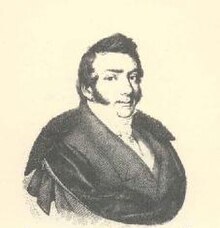Nicola Vaccai
Nicola Vaccai (also: Vaccaj) (born March 15, 1790 in Tolentino near Ancona , † August 5, 1848 in Pesaro ) was an Italian singer (tenor), composer and singing teacher . During his lifetime he was one of the most influential composers of Italian bel canto . Today he is best known for his practical school of Italian song .
Life
Vaccai trained as a dramatic composer under Paisiello in Naples and had great success as such, especially with his opera Giulietta e Romeo (1825), the third act of which was considered so effective that it was partly similar to Vincenzo Bellini's I Capuleti ei Montecchi ( 1830) substituted.
From 1829 on, Vaccai worked for several years in Paris and London as a singing teacher before he took over the post of first composition teacher at the Milan Conservatory in 1838 , which he held until his death. He died in Pesaro on August 5, 1848.
In addition to his numerous operas and church compositions , he earned a lasting merit through two studies for singing lessons: Metodo pratico di canto italiano per camera and Dodici ariette per camera, per l'insegnamento del belcanto italiano .
Metodo pratico di canto italiano
Vaccai's Practical School of Italian Singing ( Metodo pratico di canto italiano ) appeared in Italian in 1832. It is aimed at both the singing amateur and the professional singer. It was the intention of the author to give the singing student a collection of basic exercises that do not rely on the mechanical repetition of solfeggias and vocalises . In this way the study of singing should be "entertaining, entertaining and useful". Vaccai chose short poems Metastasios , one of the most important librettists of the Settecento, as the basis for the text .
As a result, the work was also translated into German and English. It consists of 15 lessons, each in the form of short songs for voice and piano. The first five lessons deal with legato at different intervals. The other lessons deal with coloratura , decorations , portamenti and the recitative .
Today the Metodo Pratico is one of the most widespread schools of classical singing and is available in print in three editions for the different pitches.
Works
Operas
- I solitari di Scozia (Naples, Teatro Nuovo, February 18, 1815)
- Malvina (Venice, Teatro San Benedetto , June 8, 1816)
- Il lupo di Ostenda, ossia L'innocenza salvata dalla colpa (Venice, Teatro San Benedetto, June 17, 1818)
- Pietro il grande, ossia Un geloso alla tortura (Parma, Teatro Ducale, January 17, 1824)
- La pastorella feudataria (Turin, Teatro Carignano, September 18, 1824)
- Zadig ed Astartea (Naples, Teatro San Carlo , February 21, 1825)
- Giulietta e Romeo (Milan, Teatro della Canobbiana, October 31, 1825)
- Bianca di Messina (Turin, Teatro Regio , January 20, 1826)
- Il precipizio, o Le fucine di Norvegia (Milan, Teatro alla Scala , August 16, 1826)
- Giovanna d'Arco (Venice, Teatro La Fenice , February 17, 1827)
- Saladino e Clotilde (Milan, Teatro alla Scala, February 4, 1828)
- Alexi (Naples, Teatro San Carlo, July 6, 1828)
- Saul (Naples, Teatro San Carlo March 11, 1829, composed 1825 or 1826)
- Giovanna Gray (Milan, Teatro alla Scala, February 23, 1836)
- Marco Visconti (Turin, Teatro Regio, January 27, 1838)
- La sposa di Messina (Venice, Teatro La Fenice, March 2, 1839)
- Virginia (Rome, Teatro Apollo, January 14, 1845)
Music educational works
- Nicola Vaccai: Metodo pratico di canto italiano , Frankfurt, CF Peters; German Practical School of Italian Singing , Munich, Ricordi & Co., reprinted under ISBN 979-0204226375
literature
- Constantin von Wurzbach : Vaccai, Nicolo . In: Biographisches Lexikon des Kaiserthums Oesterreich . 49th part. Kaiserlich-Königliche Hof- und Staatsdruckerei, Vienna 1884, pp. 171–176 ( digitized version ).
Web links
- Sheet music and audio files by Nicola Vaccai in the International Music Score Library Project
- Works by and about Nicola Vaccai in the catalog of the German National Library
- Nicola Vaccai at Operissimo on the basis of the Great Singer Lexicon
Individual evidence
- ^ Vaccai (1832): Metodo pratico, foreword
| personal data | |
|---|---|
| SURNAME | Vaccai, Nicola |
| ALTERNATIVE NAMES | Vaccaj, Nicola |
| BRIEF DESCRIPTION | Italian singer (tenor), composer and singing teacher |
| DATE OF BIRTH | March 15, 1790 |
| PLACE OF BIRTH | Tolentino near Ancona |
| DATE OF DEATH | August 5, 1848 |
| Place of death | Pesaro |
